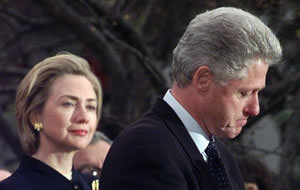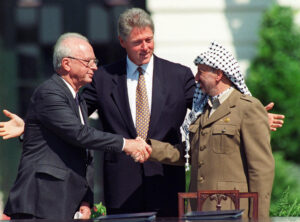Campaign 2008: Adultery Becomes Ho-Hum
Truthdig is pleased to welcome Bill Boyarsky, one of the top political journalists in America, to the site. Bill will be adding his insights, honed over decades of reporting about presidential elections for the L.A. Times, to our political coverage in upcoming months.
Remember how the country held its breath while the Senate voted on Bill Clinton’s impeachment and he survived by just a few votes? He paid a high political price for violating the no-nonsense commandment “Thou Shalt Not Commit Adultery” and lying about it.
The era of the Scarlet A in politics seems so long ago, especially today, as the three top candidates for the Republican presidential nomination are confessed violators of the commandment, yet their sins are relegated to surprisingly low positions in news stories about their prospects.
Not until the 11th paragraph of the Wall Street Journal’s rave story on Newt Gingrich (“He’s Back”) was there a mention of “two messy divorces,” and not until the 17th paragraph were there more details, tactfully presented. The admitted violations by John McCain and Rudy Giuliani are dealt with in similarly restrained fashion. In each case, they are treated analytically, as political problems to be overcome. There is hardly any condemnation from the Republican religious right.
It’s easy to say this is hypocrisy. There is a good amount of hypocrisy on the part of the media and the religious right. But I think there is something else at work.
First, let’s talk about the media. Seldom have so many reporters been roused to such investigative intensity as those on the Clinton adultery trail, first in Little Rock and then the White House. Pursuing tips from various anti-Clinton Arkansans and right-wingers, reporters eventually nailed him.
That was OK. But the journalism establishment was incredibly sanctimonious about its scandal-chasing, just as it had been several years before in pursuit of Sen. Gary Hart. In both cases, the pursuit was justified by invoking that often self-serving press motto about “the public’s right to know.”
Having been trained in the rough, raffish and competitive world of San Francisco Bay Area newspapers many years ago, well illustrated by the movie “Zodiac,” I’ve always thought it was more honest to talk about the overriding right in journalism — the owners’ right to sell newspapers. Once, while suffering through a panel discussion on journalistic scandal-hunting, I asked why we don’t admit we chase stories because they are hot and we don’t want to get beat by a competitor. A couple of the panelists sneered their contempt.
For reasons I haven’t quite figured out, the Gingrich, Giuliani and McCain stories aren’t hot. Maybe they’re too old. Maybe the media, after the nation failed to jump on the Clinton impeachment bandwagon, have figured out that adultery doesn’t sell as well as it once did. But such considerations don’t explain the comparative silence of the religious right.
Where are the battle cries against secularism, such as the declaration of Pat Buchanan at the 1992 Republican National Convention after he lost his campaign for the party’s nomination?
“There is a religious war going on in our country for the soul of America,” he said. “It is a cultural war, as critical to the kind of nation we will one day be as was the Cold War itself.”
Although he lost the nomination, Buchanan invigorated the religious right, giving it the raw meat it wanted.
President George H.W. Bush could not do that, which may have contributed to his loss to Clinton; nor could the sardonic, worldly, divorced 1996 nominee, Bob Dole.
Bush’s son understood much better. With his adviser Karl Rove, Bush snared the right with his opposition to abortion and gay rights and his advocacy of an intolerant and puritan form of family values. The religious-right voters powered him to victory in two elections. They seemed to be the monolithic base Rove had envisioned.
Meanwhile, a much stronger current was building. In the prosperous years produced by Clinton’s economic policies, Americans had the leisure to debate what was happening in other people’s bedrooms. The war in Iraq changed that. Rove tried to work his dark magic during the 2006 election. The Republicans once again sought to mobilize their religious base. They tried to paint the war as a success. Military funerals were downplayed, and the president surrounded himself with cheering troops in his appearances, rather than amputees and brain-damaged survivors of the war.
But it didn’t work. When Bush visited Montana during the campaign, usually a huge news event, the lead story in the local paper was the return of a local soldier killed in the war. As reservists and National Guard personnel returned from duty, and were recalled, word spread through the Midwest and the South — the Bush heartland — as well as along the two coasts.
There’s a rule in politics that when times are good, people have time to fret about social issues, such as same-sex marriage. It’s a rich subject for an argument. It gives cable television guests and commentators a chance to scream at each other.
At this moment in history, there something more important going on: a war to stop.
Your support matters…Independent journalism is under threat and overshadowed by heavily funded mainstream media.
You can help level the playing field. Become a member.
Your tax-deductible contribution keeps us digging beneath the headlines to give you thought-provoking, investigative reporting and analysis that unearths what's really happening- without compromise.
Give today to support our courageous, independent journalists.





You need to be a supporter to comment.
There are currently no responses to this article.
Be the first to respond.